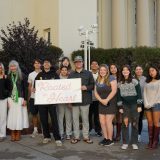So you’re in an MFA program–now what? A guest post by MFA Candidate Geneva Trelease
May 7, 2019
How to MFA and Work Full-Time
by Geneva Trelease
Working full-time and being an MFA in Creative Writing student is challenging, but it can be done! I’m the proof.
I’m a full-time high school teacher and a part-time MFA student at Chapman University. Here, I’ve assembled some tips on how to keep your sanity and maybe even feel a little awesome while juggling a job and Chapman’s MFA program.
#1 Plan
The first strategy I’ve used to help me stay organized this semester is weekly planning on Sunday nights. During this time, I look through the syllabi for my MFA courses and schedule out assignments and readings for the next week in my planner. I divide up the tasks for afternoons and evenings after work and set alerts and reminders on my phone for due dates. I also consider obligations for work (meetings to attend, assignments to grade, lessons to organize) and schedule time for that too. I find that writing it down clears my mental space. Rather than feeling like I have an infinite number of tasks and responsibilities circling my mind, I can open my planner and see all the things I need to accomplish for the week—and it all fits.
#2 Separate Your “Selves”
This has probably been the most challenging aspect about working and MFA-ing, and it is something I’m still trying to figure out. Making separate time and space for my “work self” and “writer self” is very difficult. I try to get most of my work done in my classroom, but I also take a lot home. I’ve been trying to divide my life into different spaces for different work in order to make it easier to step into various roles. My desk in my apartment is for MFA class assignments, the kitchen table is for grading, and a local coffee shop is for creative writing. It has been helpful to feel as if certain spaces and times are used for different writing tasks. I would recommend trying this to others who transition between different “selves.”
#3 Take Advantage of Resources
There are so many helpful resources on campus and within the program at Chapman University. My top suggestion for university resources is the Leatherby Libraries. Whenever I have time before classes, I find myself a spot in the library and get to work. Some of my most productive time this semester has been during quiet hours in the library before evening classes. The library also has a fantastic archive of online journals and a variety of sources to use on papers and projects.
Other resources that the program provides are awesome GUS sessions (free, no-credit, three-hour, special-topics workshops) and guest speakers. It may be challenging to fit these events into your busy schedule, but they offer time and space for you to work with other writers and learn from experts. In just the first semester, I was inspired and learned a lot from visiting poets, authors, and industry pros like poets Valerie Wallace and Michelle Bitting, science writer Rebecca Skloot, and literary agent BJ Robbins.
Of course, my professors and classmates have a wealth of knowledge and, ultimately, are the best resources for support. Sometimes, I find it difficult to speak up or connect with others when I’m exhausted from working with 172 high schoolers every day. Anyone who has a full-time job will probably be drained, but being present, asking questions, and making connections with other talented writers in our classes is truly the most valuable part of this program.
#4 Make Time for Down Time
Juggling work and an MFA feels entirely overwhelming at times, so it’s important to schedule down time. These should be moments in your week not spent working on assignments, checking email, or planning out tasks. I spend this time far from my phone and computer. This window of time without a purpose or objective can, in turn, become inspiration for your creative work. I suggest riding a bike, going to a movie, trying a new restaurant, or curating a playlist. When we let our minds wander away from the usual rotation of tasks, we free up space for new and interesting ideas.
Honestly, I am still working on taking much of this advice. Working full-time and MFA-ing is tough, but it is possible, and I’m glad I’m doing it. I feel so much support within the program that I feel fully part of it and know I have something important to say. Stay organized, stay positive, and all of us will thrive as both a professional in our jobs and as MFA students at Chapman University.

